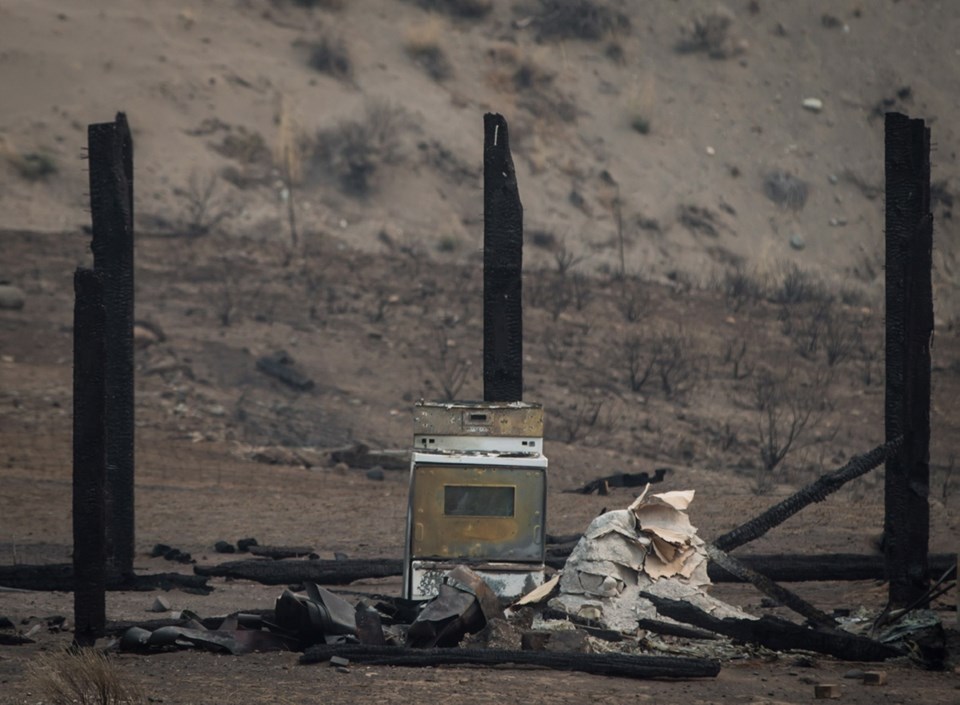B.C. Hydro is taking measures to protect a major substation in the Interior that brings power to the Lower Mainland and Vancouver Island as a wildfire burns a few kilometres away.
The Kelly Lake substation is about 14 kilometres southwest of Clinton, and electricity from the Peace River hydroelectric system is supplied to the Lower Mainland and the Island through the substation.
The Village of Clinton, which is home to about 650 people, was placed on evacuation alert July 14 and an evacuation was ordered July 29. That order remains in effect. Surrounding areas — including the southwest, where the substation is located — are also under evacuation orders.
Evacuations were ordered thanks to the Elephant Hill wildfire (formerly the Ashcroft Reserve fire), which currently covers about 937 square kilometres. It’s 30-per-cent contained, but according to Kevin Skrepnek, chief fire information officer for the B.C. Wildfire Service, the fire is considered “very active” and it’s continuing to grow. The weather has contributed to some “aggressive fire behaviour” on the southwest side of the blaze.
“Certainly this is our highest-priority fire in the province right now and we are working on all flanks of it to try and get it contained,” said Skrepnek.
Clinton village Coun. Susan Swan posted her concerns about the substation on Facebook, saying if the Elephant Hill fire isn’t under control soon, people in the Lower Mainland will have more to worry about than poor air quality due to fire smoke.
“If the fire damages that substation or those power lines, many parts of the Lower Mainland could lose their power,” she wrote. “This isn’t just an Interior B.C. problem. This is a B.C. problem.”
When contacted by Postmedia News, Swan said she just wanted the public to be aware that the fire could affect more people than those living in the immediate area.
Chris Duffy, executive director of Emergency Management B.C., was on a call with B.C. Hydro and other utilities Friday morning and said Hydro has been apprised of the risk to the substation.
“They have, in fact, done some fire-guarding work around there to protect the asset and they’re aware of the fire that is in the area,” Duffy said.
Although the fire is several kilometres from the Kelly Lake substation, B.C. Hydro spokeswoman Mora Scott said they have sprayed fire retardant on two wooden storage structures on the property, cleared vegetation around the substation and cleared the yard of all combustibles. Hydro has also sourced 2,500 gallons of water to help the fire department if the blaze gets close to the substation.
The precautions are similar to what B.C. Hydro has taken with other substations or infrastructure that have been in or near areas affected by wildfires.
“From what I understand, though, the fire is still pretty far away, so the station manager in the area isn’t too concerned,” Scott said. “But obviously in a situation like this we do everything we can to protect our infrastructure, especially things like substations because they are really important.”
Scott said people may be worried because there was a fire in 2009 that got close to the substation, but that one was much closer than the Elephant Hill fire.
At this time, no other substations or major pieces of Hydro equipment are threatened by the wildfires.
To date, Hydro has replaced about 900 pieces of equipment — including distribution poles, wire, cross arms, transmission structures and transformers — and restored power to more than 49,000 customers in areas affected by wildfires.
The wildfire-driven provincial state of emergency was extended for a second time Friday and will last until the end of the day on Aug. 18. It applies to the whole province and ensures public safety and that resources can be delivered in a co-ordinated way.
As of Friday afternoon, there were 123 wildfires burning in B.C. — nine of which started Thursday — and 27 evacuation orders affecting about 7,100 people, plus 41 evacuation alerts affecting 24,700 folks.
Since April 1, there have been 872 fires across B.C. that have burned 5,090 sq. km. So far, $211.7 million has been spent fighting the fires.



